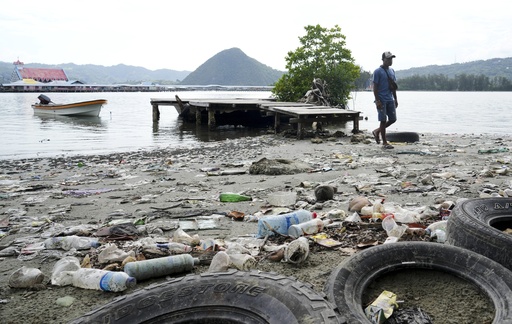
A crucial series of discussions on a legally binding treaty aimed at combatting the global issue of plastic pollution has commenced in Busan, South Korea. Here are the key points to consider:
Delegates from various nations are engaged in in-depth negotiations as they strive to finalize a comprehensive treaty. A major source of contention is whether to impose limits on the volume of plastic that companies are permitted to produce. Led by Norway and Rwanda, a coalition of 66 nations alongside the European Union is advocating for the management of total plastic production on Earth through control over plastic design, manufacturing, consumption, and disposal practices.
Conversely, several countries known for their plastic production, particularly those in the oil and gas sectors like Saudi Arabia, are firmly opposed to such restrictions. The Organisation for Economic Co-operation and Development has warned that without policy interventions, global plastic production could increase to 736 million tons by 2040, reflecting a staggering 70% rise since 2020.
In addition to production limits, negotiators are grappling with whether the treaty will aim to diminish or abolish single-use plastics, as well as address the use of hazardous chemicals in plastic materials. A decision is still needed on whether these initiatives would be obligatory or merely recommended.
The underlying goal of all parties is to safeguard both human health and environmental integrity. Many nations share common ground regarding treaty provisions, expressing a desire to encourage the redesign of plastic products to enhance their recyclability and promote reuse. There is also a collective interest in investing in effective plastic waste management, raising recycling rates, and facilitating safer job transitions for waste pickers. Furthermore, there’s a consensus on the necessity for a financial mechanism to support countries in meeting their treaty obligations.
Environmental activists and Indigenous representatives are advocating for a more comprehensive approach to the crisis. Graham Forbes, who is representing Greenpeace at the negotiations, emphasized the importance of establishing a framework that genuinely reduces plastic production, removes toxic substances, and shields communities from the unregulated influx of plastics. He acknowledged that achieving this goal requires a level of political resolve that has yet to be seen in prior negotiations.
Frankie Orona, the executive director of the Society of Native Nations, stressed the need for a treaty that addresses the fundamental causes of plastic pollution, rather than focusing solely on waste management. He urged stakeholders to seize this historic moment to create a sustainable future free of toxic materials for future generations.
On the other hand, industry representatives are advocating for an agreement focused on the redesign, recycling, and reuse of plastic materials to curb pollution. They argue that such measures would help keep plastics in circulation rather than letting them pollute the natural environment. Company leaders have expressed their willingness to support a treaty that acknowledges the societal benefits of plastics while simultaneously working to reduce pollution levels.
Steve Prusak, the president and CEO of Chevron Phillips Chemical Company, highlighted the importance of finding common ground among diverse stakeholders, warning against the dangers of divisive issues that could undermine progress. He noted that this is a pivotal moment and expressed optimism that negotiations will yield actionable and globally harmonious policies.
Lastly, U.N. Environment Programme Executive Director Inger Andersen remarked that these discussions present a once-in-a-lifetime chance to forge a meaningful agreement and redirect current approaches to managing plastic waste. She pointed out the urgent need for action, as unprecedented amounts of plastic continue to accumulate in the world’s oceans.
